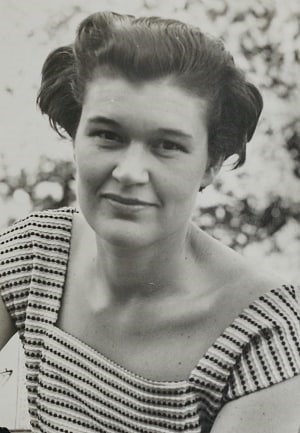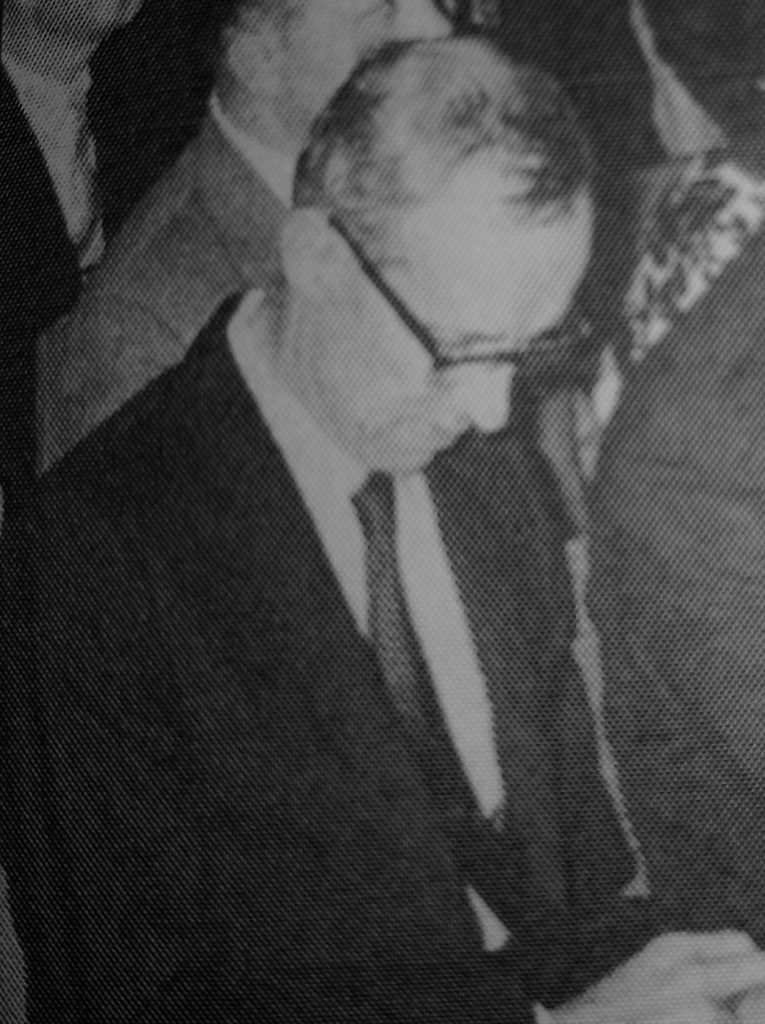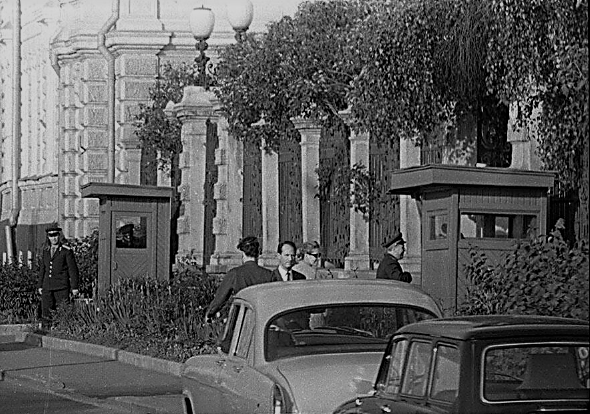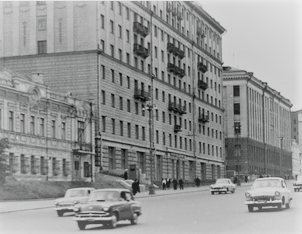
For the first —and no doubt only— time, Russia in Fiction is reviewing a book that does not mention Russia.
And its set-up cannot fail but bring to mind the 2006 Oscar-winning German movie Das Leben des Anderen (The Lives of Others).
In the basement of a block of flats in the capital of ‘an anonymous Iron Curtain country’ called Commitania, sits a man, headphones on, tape reels whirring, listening in on conversations throughout the apartment block.
And how do we know it is about Moscow in the 1960s? Regular readers of this blog might already have picked up the clues.
Not only did Anne Telscombe disguise the country in which The Listener is set, she disguised her own identity too. And in both cases this no doubt had much to do with diplomatic niceties and the requirements of her former employer, and the continued employer of her husband. Anne Telscombe was the pseudonym of Marie Dobbs. Her husband Joe was a British diplomat, in fact one of Britain’s leading experts on Russia, and the Dobbs lived in Moscow —with their growing family— for most of the 1960s whilst Joe served in the British Embassy there.



As it happened, the Dobbs lived in the same apartment block as fellow British diplomat Martin Nicholson and his family. Martin is the author of a series of self-published memoirs (as noted in our review of Sarah Armstrong’s The Wolves of Leninsky Prospekt).
In Activities Incompatible (2013), Martin Nicholson writes of his Moscow posting in the 1960s, noting that the Dobbs family and their four children lived on the floor above the Nicholsons, in the foreigners-only block on Sadovo-Samotechnaya Street.

This block, known as ‘Sad Sam’, turns up regularly in novels and memoirs of the Soviet era, as it was the ‘Moscow posting’ home for hundreds of Western diplomats and journalists over decades.
It is from Martin Nicholson’s memoirs that we gain certainty that The Listener is Russia-in-fiction territory.
While we were in Moscow Marie made no secret of the fact that she was working on another novel. It would feature the KGB man supposedly in the basement of our block monitoring our conversations through the hidden microphones …
When The Listener was published in 1968 we could tease out some familiar individuals from our block, lightly disguised in the composite characters Marie had created.
Indeed, one of the families central to the plot of The Listener had, like the Dobbs family, four children.
Anne Telscombe had already authored two novels before The Listener; Miss Bagshot Goes To Moscow (1961) and Miss Bagshot Goes To Tibet (1967).
Although written in a similar light tone to the Miss Bagshot novels, The Listener deals with a subject matter —covert surveillance— that has an intrinsically dark timbre. The story introduces us skilfully to a set of international diplomats and their families, weaving various sub-plots around broken friendships, political events, and the joys and irritations of daily life for the somewhat segregated foreign community in Brezhnev’s Soviet Union.
Central to the plot is Andrei, the titular basement-dwelling listener. In a pleasingly original take on how the KGB (called ‘the Department’) liked to look after its own, Telscombe depicts the Department as a solicitious employer
always showering its Listeners with minutes, advising them on health and morale. It also supervised their diet, arranging for the van men [who picked up the tape recordings] to deliver fresh rations every evening —vitamin-calculated packaged meals, labelled with meticulous directions on which times of the following day they were to be consumed.
A deep concern was always being expressed at Headquarters for the solitary Listeners; not without cause; for despite the responsibility and generous salary attached to the post, few Listeners remained on the job for longer than a year … the disadvantages of being cut-off from everyday life forced them to seek more normal employment elsewhere.
Andrei was one the very few Listeners who had managed to survive a second year of the strain.
The listener, p. 21
Andrei is proud of the fact that he will not go the way of his predecessor Dmitri. As the novel progresses, such assurance begins to fade.
‘But I am not like Dmitri,’ he told himself indignantly. He had common sense and the capacity to see and think for himself clearly. Nervous breakdowns, surely, only crept up and took people unawares when they made no effort to resist them.
‘It’s not going to happen to me,’ Andrei said bracingly.
the listener, p. 110
Whilst it is surely unlikely that there is any direct connection between The Listener and the Oscar-winning German film Das Leben des Anderen (The Lives of Others), it is hard —if you have seen it— not to think of that film when reading this novel. It is hard not to see the image of the man in a sparse basement room, headphones on, an outwardly passive listener to the vibrant lives going on above him.
As in The Lives of Others, The Listener has scenes where the state eavesdropper, momentarily away from his electronically adorned basement, meets some of the occupants of the block. He briefly smiles at them before realising that whilst he knows their every intimacy, they have no idea who he is.

And, like The Lives of Others, The Listener has a key scene where the titular central character travels in a lift with a young boy.
Andrei begins to go the way of Dmitri
For the first time in his career, Andrei had failed to record a highly useful conversation: one which would have interested the Department to an extraordinary degree. For the first time in his life, he had decided his career would have to take second place to a compassion for two people he had never met. He felt he had no business to have been listening to their private conversation himself; and no justification whatever for passing it on to the Department …
For the very first time Andrei began to understand how these diplomats must feel about the microphones in their flats; how unpleasant it must be for them to have their private concerns pigeon-holed and catalogued in impersonal files. No doubt the Department wouldn’t see it in the same light. But the Department would never know. The Department could go to hell anyway.
the listener, p. 150
For all that The Listener is a light and entertaining read. For all that its Russian setting is disguised. For all that its plot develops entirely within the confines of one apartment block. Despite all this, in its quiet way The Listener powerfully portrays a central aspect of the Soviet state; its monitoring of the people to such an extent that its eyes and ears seemed to be almost everywhere. Many Soviet citizens of those years distinguished between what could be said around the safety of the kitchen table, and what could be said more widely.
For Westerners, subversive by dint of their nationality, not even the kitchen table could be assumed safe from the ears of the state. The Listener subtly reveals the alienation visited upon and felt by such foreigners living in the USSR in those years.
As Andrei’s internal monologue builds, it seems as if its climactic outburst, untypical of his character throughout the rest of the novel, is really the authorial voice breaking through. The voice of Marie Dobbs, living in her Moscow apartment with her diplomat husband and four children, convinced that their private familial lives were not private, that their day-to-day, every hour of the day, week by month by year, was being listened to.
The Department could go to hell.